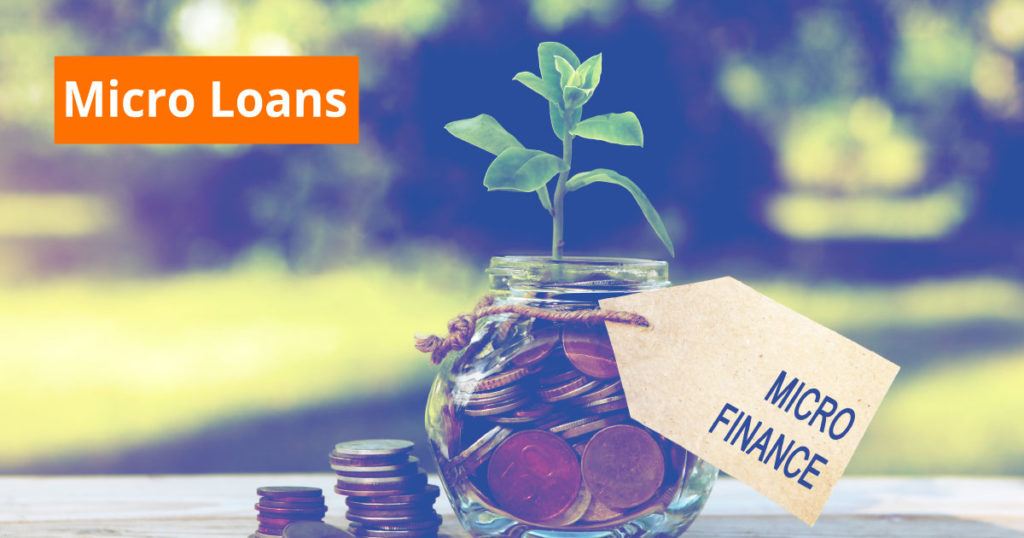Microloans work a bit like regular business loans, but they’re smaller—usually around $50,000 or less. They’re handy for small business owners who got a “no” from big banks that aren’t too keen on lending small sums.
So, if your business could use a little cash boost, and the big banks turned you down, giving microlending a shot might be a smart move. It’s like a small but powerful financial pick-me-up for your business.
But which ones are best for your needs? Fear not, that’s what this article is all about. Let’s dive into the following piece to find out about the best instant approval microloans.
What is a Microloan?

Microloans are tiny, short-term loans with low interest, mainly given to self-employed folks, startups with minimal capital needs, or small businesses with a handful of employees. They’re business loans, typically up to $50,000, used to kickstart or expand a business.
Microloans function like regular business loans but come from unconventional sources. They aim to give entrepreneurs, who might not qualify for traditional loans, access to affordable working capital. The purpose is to fund business ideas, expenses, or growth. Repayment, with interest, is expected over a fixed period.
Microloans are versatile and fit various business needs. Some microlenders may limit fund usage, but they’re generally suitable for small, short-term capital needs like starting a business, buying inventory, covering payroll, managing seasonal costs, or financing marketing strategies.
If traditional bank loans have been a challenge, microloans are worth considering. Microlenders often have more lenient qualification requirements, making them popular among freelancers, consultants, sole proprietors, and new business owners.
What are the Best Instant Approval Microloan Lenders?
If you are in need of quick micro-financing, here are some of the best options we have gathered for your needs:
SBA Microlenders
The SBA microloan program, managed by the U.S. Small Business Administration, channels microloan funds to businesses through local nonprofit groups. Instead of directly providing loans, the government works with these community-based organizations.
These intermediaries not only handle the microloans but also offer guidance and support to help borrowers launch or expand successful businesses.
Let’s take a look at the key offerings of SBA microloans:
- You can borrow up to $50,000.
- The maximum repayment period is six years.
- Interest rates vary (usually between 7% to 13%) and depend on the lending organization.
When securing a microloan, the terms are negotiated with the intermediary lender based on factors like the loan amount, your needs, planned use of funds, and the lender’s standards. In 2019, the average SBA microloan was $14,735 with a 7.5% interest rate.
While the SBA doesn’t mandate it, some intermediaries prefer businesses that are minority or woman-owned or those in financially distressed areas. When applying for an SBA microloan, you’ll connect with a local intermediary lending organization to start the process. Reach out to your SBA district office for assistance.
Getting money from an SBA loan usually takes anywhere from 30 to 90 days, microloans are no different. If your small business needs cash quicker, it might be worth looking at other options instead of an SBA loan.
Accion
Accion is a global nonprofit on a mission to empower people worldwide with the financial tools to grow healthy businesses. In the United States, Accion USA is the biggest network of local microlending organizations.
Accion, being a nonprofit, can offer really low interest rates—starting at just 5.99%. That’s way less than what many other lenders charge. Unlike some lenders who use a one-size-fits-all approach, Accion personalizes each loan to fit the unique needs of a business. They don’t insist on a minimum credit score; instead, they look at the bigger picture of the business.
What’s cool is that Accion doesn’t just stop at lending money. They make sure their customers get educational opportunities to boost their success. We think these things make Accion the top choice for folks who might not get the same deals elsewhere.
Accion doesn’t just offer tiny microloans; they can go up to $1 million. While they do more than just microlending, it’s a significant part of what they do. To qualify, you’ll need a credit score of at least 575, no bankruptcies in the last year, no foreclosures in the last two years, and no more than $3,000 in unpaid tax liens or court judgments. Startups need a cosigner, and the requirements might vary a bit depending on the Accion branch you apply to.
Accion is a great choice for…
- People running businesses from households with lower incomes, individuals with disabilities, women, immigrants, people of different backgrounds, and military veterans.
- Really small businesses or startups that can put Accion’s microloans to good use.
- Folks applying for loans who don’t have much or any credit history.
LiftFund
LiftFund stands out as a top middleman for the SBA microloan program. They’re not just intermediaries; they’re microloan champions in their own league, providing over $210 million to small businesses in 13 states: Alabama, Arkansas, Florida, Georgia, Kentucky, Louisiana, Mississippi, Missouri, New Mexico, Oklahoma, South Carolina, Tennessee, and Texas.
LiftFund is active in the microloan scene, offering amounts from as little as $500 to a substantial $1 million. If you qualify for their microloan, you have the flexibility to use it for various business needs—whether it’s kickstarting your business, getting inventory, buying equipment, or improving real estate.
The only thing to keep in mind is that if your loan is for a startup, you’ll need to show that you have another source of income, like a spouse’s income or another job, to pay back the loan. LiftFund also asks for collateral equal to the loan amount you’re requesting. The main things that might disqualify you are ongoing bankruptcies and unpaid tax liens without a payment plan.
LiftFund takes a bit longer to give the green light compared to smaller lenders. While some lenders can send the approval in just a few days, LiftFund says it will likely take about a month for them to give the thumbs up. This wait time is a downside for LiftFund, so if you’re looking for quicker loan approval, there are other lenders out there who can get you the money faster.
Grameen America
Grameen America has a unique way of doing microloans: you team up with four other trustworthy women, and together, you go through some financial training. After the training, each of you gets a microloan to kickstart your small businesses. Your group of women meets weekly to pay back the loans and keep learning.
For your first loan, you can get anywhere from $500 to $2,000, and you have six months to pay it off. If you’re doing well with repayments and your Grameen America location supports you, every six months, you might have a shot at getting even larger loans.
Here’s the cool part: Grameen America doesn’t need you to have a minimum credit score, business income, or collateral to get funding. This microloan program is all about helping women entrepreneurs grow their businesses, boost their credit, and create job opportunities in their communities.
If you check all the criteria to be eligible for their microloan, you will get your loan as soon as possible from the organization.
Kiva
Kiva U.S. is a part of Kiva, a nonprofit that does microlending between people in almost 80 countries.
To get an interest-free microloan (up to $15,000) from Kiva U.S., you start by applying for pre-qualification. Then, you ask your friends and family to chip in and support your project. Kiva doesn’t make you show a minimum credit score or years of cash flow statements or ask for collateral. Instead, they check out your creditworthiness through something called “social underwriting.”
Once you’re good to go, Kiva opens up your loan to people who want to help fund it. The fundraising part takes about eight weeks, and you’ve got up to 36 months to pay back your loan.
Kiva can be a good choice if you need a smaller amount of money (like $15,000 or less) and have solid social or community backing.
Folks who take the first step and talk to their community can often get their loan in just one week. On average, the whole process usually takes a few weeks. So, start by figuring out exactly how much money you need to borrow.
Opportunity Fund
Their goal is to support small business owners by providing them with loans, especially focusing on women and minorities who might face challenges getting traditional financing. They’re currently working in California and Nevada, with some loans available in New York and Washington.
You can qualify for amounts ranging from $2,600 to $250,000, depending on the type of loan. The repayment period is between one and five years. You’re free to use the funds for various business needs like working capital, buying equipment, improving your space, getting commercial vehicles, refinancing debt, opening a new place, or even acquiring another business.
What’s neat about Opportunity Fund is that they move quickly. You’ll find out if you’ve been approved for a microloan in just three to five business days. So, if you are looking for fast approval for minor expenses, it’s a speedy process to get the funds you need for your business.
How to Qualify for a Microloan?
Every microlender has its own rules for deciding who can get a business loan. Some might only work with businesses in certain places or industries, or with owners who have specific characteristics.
As mentioned earlier, microloans are meant for small or growing companies, so the rules are usually not super strict. However, the microlender might want to know about things like:
- Your credit scores
- How much money your business makes
- Other ways you earn money
- Your business plan
- How long you’ve been running your business
If they do look at your credit score, it’s usually just part of the whole picture. But, if your business is dealing with serious money problems, like going through bankruptcy, it might make it hard to get a microloan.
If you’ve decided that a microloan is the way to go for your business, here’s a simple guide on what to do:
Check Your Credit History
While microlenders usually don’t focus too much on your credit score, it’s still a good idea to try and improve it. Pay down your debts and fix any mistakes on your credit report before applying for a loan.
Get Your Financial Documents in Order
Having all your financial papers organized can make the loan application process smoother. If you miss something or forget to include important info, your application might get turned down.
Be Ready for Collateral or a Personal Guarantee
Some microlenders might ask for business assets as collateral to secure the loan. You might also need a personal guarantee, meaning you’d be responsible for paying back the loan if your business can’t.
Compare Your Options
Take a look at what each lender offers to find the best fit for your business. You can also use our business loan calculator to see how much you can borrow, compare interest rates, and get a clear picture of what you’ll pay.
Remember, it’s about finding the right match for your business needs!
Bottom Line
Microloans are like a helpful hand for your business when you need a bit of extra money or if regular banks deny your appeal. Nonprofit groups and the SBA microloan program are good places to look for these small loans.
It’s a way to give your business that extra push it might be craving, improve your credit, and even set the stage for more funding down the road if you need it. It’s like a friendly boost for your business dreams!

